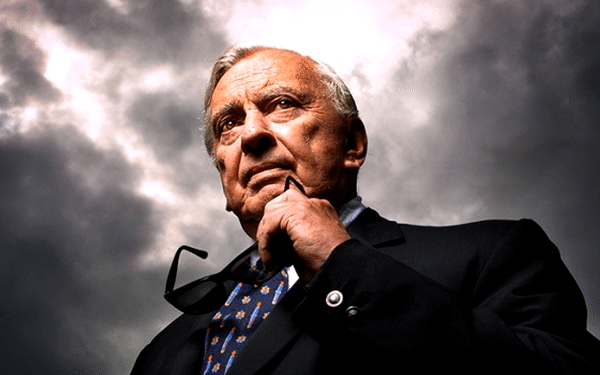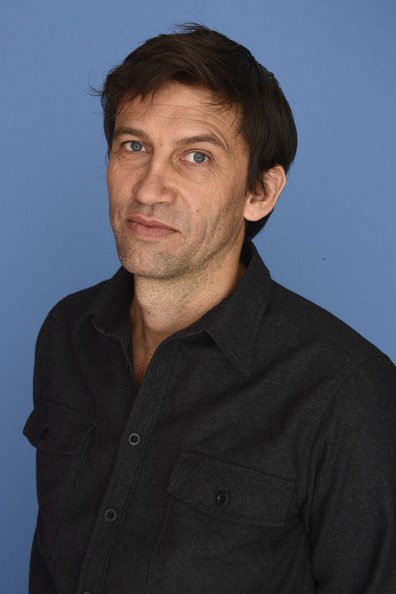
 Nicholas Wrathall is the director of the new documentary “Gore Vidal: The United States of Amnesia,” (opens in theaters on 05/23, read our review here) which chronicles the life of one of the most fascinating writers in American history. Wrathall captures the amazing scope of Vidal’s social circle, which included actors, authors, politicians, and everything in between, but mainly wishes to remind us of a man whose strong voice was always a welcome corrective to a hawkish establishment, as he proved by criticizing American presidents for adventurism abroad, from Eisenhower in Guatemala to Bush in Iraq.
Nicholas Wrathall is the director of the new documentary “Gore Vidal: The United States of Amnesia,” (opens in theaters on 05/23, read our review here) which chronicles the life of one of the most fascinating writers in American history. Wrathall captures the amazing scope of Vidal’s social circle, which included actors, authors, politicians, and everything in between, but mainly wishes to remind us of a man whose strong voice was always a welcome corrective to a hawkish establishment, as he proved by criticizing American presidents for adventurism abroad, from Eisenhower in Guatemala to Bush in Iraq.
We sat down with director Wrathall to discuss the material he used for the film, his favorite works by his subject and why Gore Vidal is due for an academic reevaluation.
Gore had so many facets and different sides to his personality. Was it difficult to show the breadth of his character?
Yeah, I sort of concentrated mostly on his political ideas and his critique and examination of American history and political culture. I think there are many, many aspects, we could have made a film just about him as a writer, but it was impossible, I realized soon into the process, to try to do a film about every aspect of his life. We could have made a who’s who of everyone he knew throughout his life, but my interest and my motivation was always about his critique of political culture. So that’s what drove me forward and also that’s what he was talking about, at the time, he was very motivated around the Bush era and that’s what he wanted to talk about. I don’t know if you’ve read the biographies, but there’s many, many stories about who Gore knew, who he slept with, who he met with, all of those things are there, and he didn’t really want to talk about that and neither did I, so we had to make choices and it was politically led.
Gore seems better suited to a documentary than many writers, because he loved to appear on television. What was the best clip you found that you didn’t find time for in the film?
Yeah, there were so many clips that we couldn’t include. Even with those Buckley debates, which I think we included five minutes of, you could have almost made a whole film of those. And there were so many clips, I must have gone through hours and hours of footage. I went to the British archives and I found a lot of material that I don’t think American audiences have seen, which was interesting. But any one particular clip…

The Norman Mailer appearance (On "The Dick Cavett Show")?
With the Norman Mailer, there was some handheld, weird footage at a dinner with Mailer, where Mailer was rebutting something that Gore had said, but it was impossible to figure out how to fit it in the film. We had a 20 minute longer version of the film, a month before we went to Tribeca, so we had to really cut it down and things just had to go.
Do you think the world is catching up to Gore’s beliefs in some ways?
I do. That’s one of the things you realize, going through the previous interviews, is just how prescient he was. There’s things he was saying in the 60s and 70s that are still in the public discourse now, which is a little crazy when you think about it. He was so outspoken that he could have been a contemporary on talkbalk television now. I do think the world has caught up, thank God, finally, to where he was. It’s a shame we don’t have someone to pick up where he left off. There’s people, I guess, in the comedy realm, like Jon Stewart and Colbert, but there’s no one who comes from the center of the political culture.
I thought an interesting aspect of the film was the discussion of Christopher Hitchens, who switched his political beliefs so much that Gore disowned him as an intellectual heir.
Yeah he did, Gore really distanced himself, and did disown him, because Hitchens made that sort of right turn in support of the Iraq war. Apart from Gore, I wouldn’t think any of us expected that kind of thing from Christopher Hitchens.
And Gore was very consistent his whole life.
He was very consistent and that was an interesting thing for me, going through the archive materials, seeing Gore having the same conversation over decades, updating it of course, but the driving force and belief never wavered. I think his ideas were formed at a very young age, growing up with his grandfather and he stuck to his guns throughout his life.
Do you think, as Gore did, that his work isn’t given the attention it deserves from academics?
Yeah I do, I’ve spoken to Jay Parini about that, who’s in the film and is a professor who was Gore’s literary executor and I know he teaches some aspects of Gore’s work up at Middlebury, but he’s not really taught much at universities. I’m hoping we can do well with some educational sales and bring Gore, at least in film form to university students again. I don’t know if it’s the style of his work, or whether it’s the political and outspoken nature of the time, that he was sidelined by the New York Times and so on, but maybe that he touched on so many different styles, from “Myra Breckinridge” to starker, biographical fiction, to the founding fathers..
And experimental stuff, like “Duluth”
A lot of experimental stuff, like “Duluth,” but I would have thought that would make him more interesting in terms of teaching, but maybe he just hasn’t had his time yet.
Or maybe he just doesn’t fit into any…
Yeah, he doesn’t fit into the box, exactly.
What is your favorite of Gore’s works and why?
There’s so many, “Burr” is one of my favorites, also “Lincoln,” just to have kind of a warts and all examination of that period and the founding fathers I found really fascinating and looking at the motivations behind what was being said. But then I love like “Kalki,” which I just reread and could have been written yesterday. I keep thinking why hasn’t anyone made a movie of this, it’s like a science-fiction story almost. So there’s a lot of different things I loved, including his essays.
For younger people who see the film and might not know much about Gore, what is the one thing you’d like them to take away from the film?
I’d like them to take away his spirit and his energy and his courage, the ability to speak truth to power and read between the lines of what’s being said. I think critical thinking is really important, a lot of people seem to accept things on face value these days and I don’t think Gore ever did that. I’ve found young people that come to see the film do feel really motivated and that’s really exciting to me. I tried to make the film in a contemporary way, where people that might only know the name can relate to the film.
“Gore Vidal: The United States of Amnesia” opens in theaters on 05/23, read our review here.